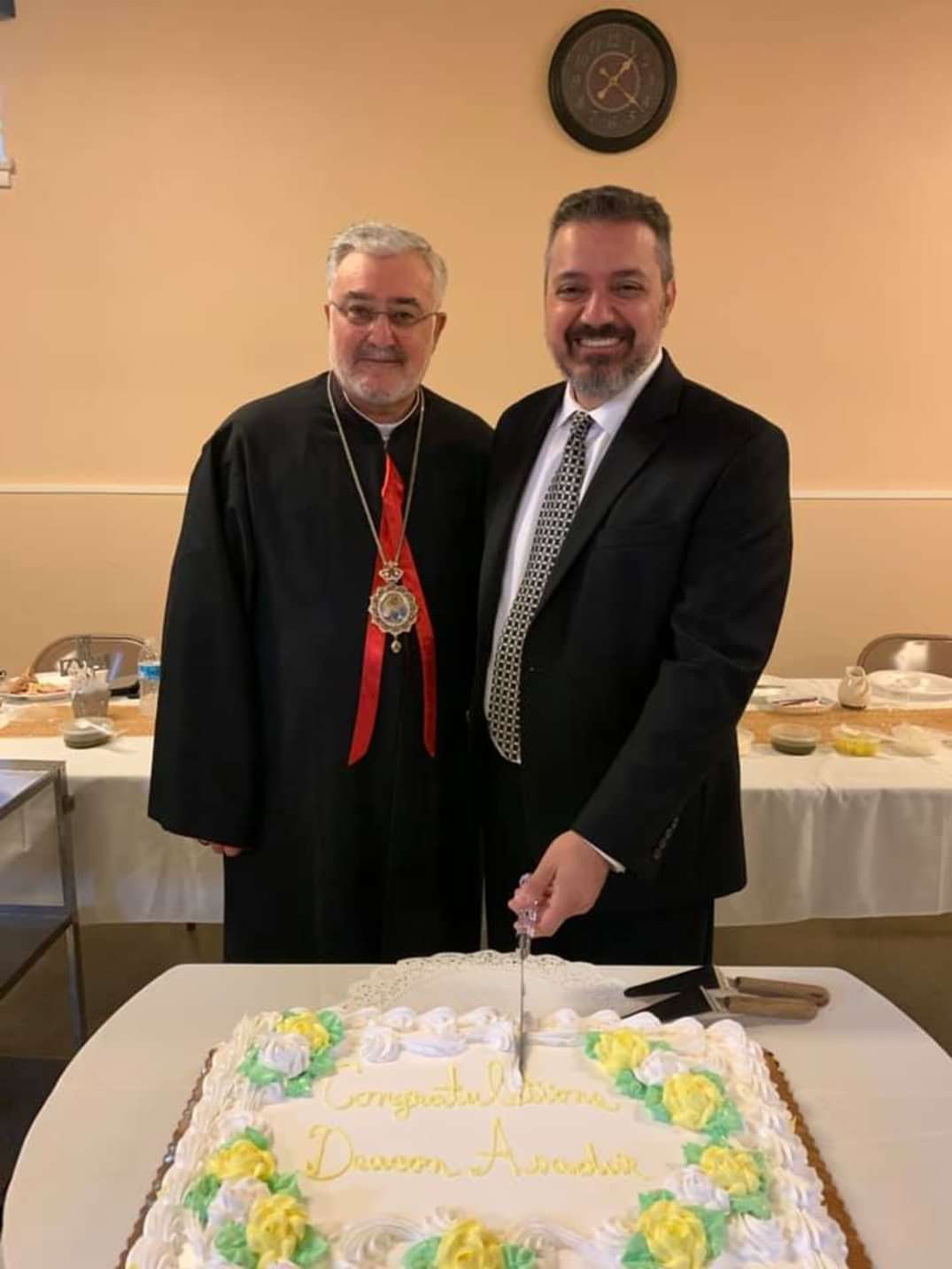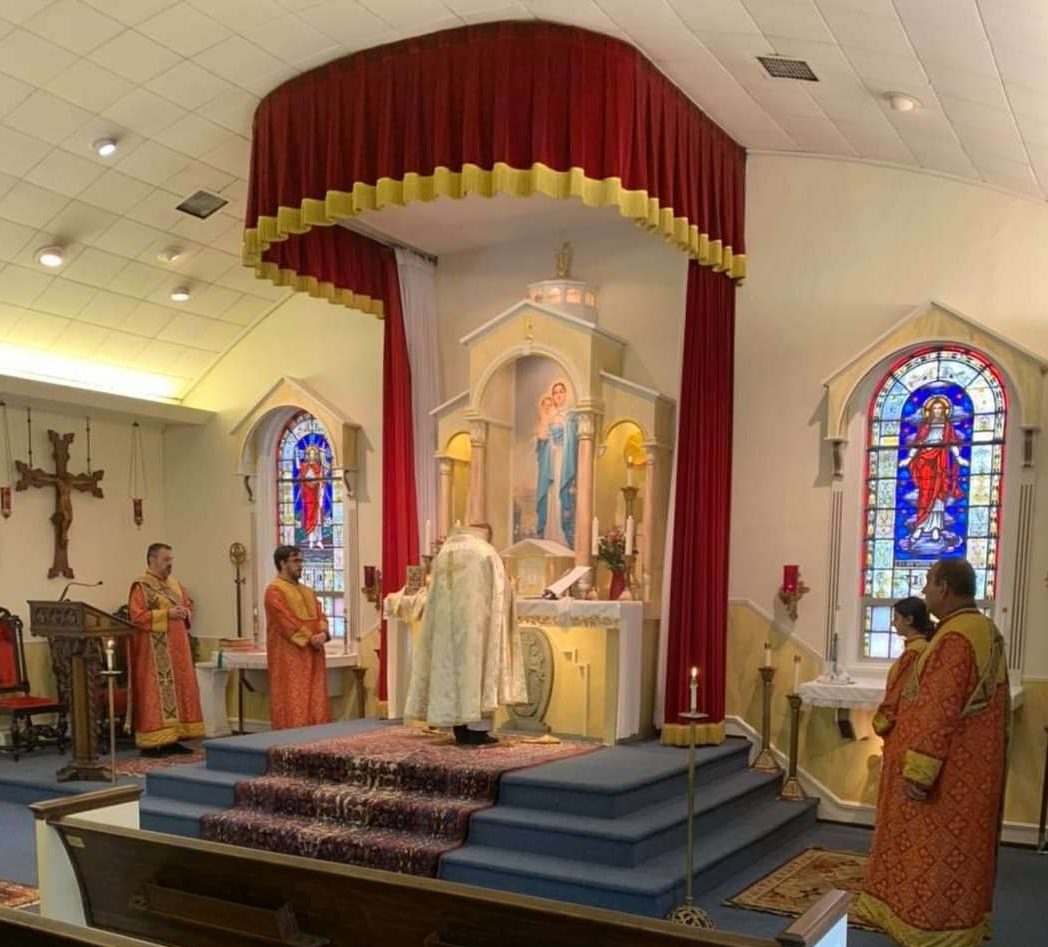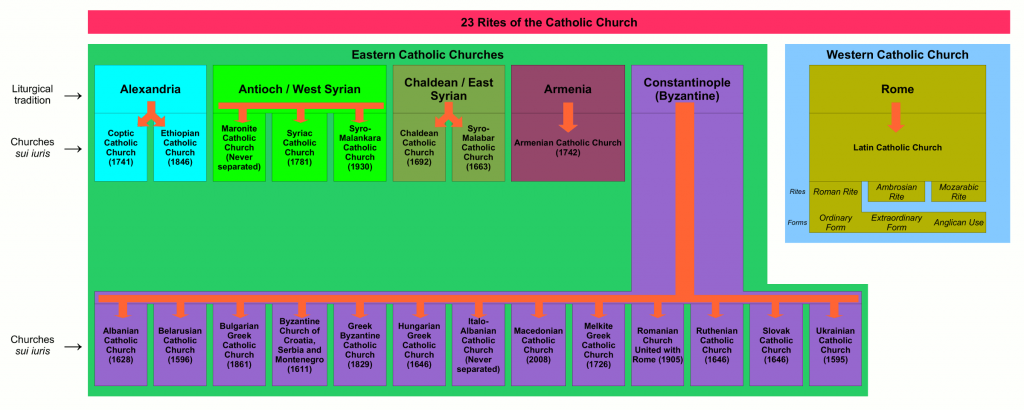 Rev. Deacon Asadur Minasian (right) with Bishop Mikael Mouradian at his ordination to the diaconate in September.
Rev. Deacon Asadur Minasian (right) with Bishop Mikael Mouradian at his ordination to the diaconate in September. Posted on 12/19/2021 4:48:39 AM PST by Cronos
 Rev. Deacon Asadur Minasian (right) with Bishop Mikael Mouradian at his ordination to the diaconate in September.
Rev. Deacon Asadur Minasian (right) with Bishop Mikael Mouradian at his ordination to the diaconate in September.
The Armenian Catholic Church in America is about to make history again when it ordains the second married priest in its history. Officially known as the Armenian Catholic Eparchy of Our Lady of Nareg in the United States of America and Canada, it was created in 1981 by Pope John Paul II as the local jurisdiction over the region’s Armenian Catholic churches. While the notion of a married Catholic priest may sound contradictory, Asadur Minasian of St. Mark’s Church in Wynnewood outside Philadelphia will soon join the rare ranks of married Catholic priests.
One of the best-known disciplines of the Roman Catholic Church is that of clerical celibacy, which in its traditional meaning refers to priests remaining unmarried. What’s less known is that priestly celibacy is a discipline rather than a doctrine, meaning it is not universal. Within the global Catholic Church are the Eastern Rite Churches, which are in full communion with the Pope of Rome and yet maintain their own traditions. As such, the Armenian Catholic Rite, like the Armenian Apostolic Church, allows for its priests to be married, though until recently the Vatican confined the practice to each rite’s “traditional territories,” which did not include the United States or Canada.
The recent change to this rule opened new opportunities for married Armenian Catholics there who felt a calling to the priesthood but had been unable to pursue it. The first was Father Richard Shackil, a lifelong member of Sacred Heart Armenian Catholic Church in Little Falls, New Jersey, who was ordained in 2017. The second will be Asadur Minasian, who was born in 1971 to parents from Istanbul. As Minasian described: “One of the main factors for them leaving Turkey was because they did not want their children to live in a country where Christianity was suppressed. It was exceedingly difficult to be a practicing Catholic in a predominantly Muslim country, and my parents were staunch Catholics.” His parents moved to Philadelphia where they were welcomed into the local Armenian Catholic church St. Mark’s by Monsignor Stephen Stepanian, who had founded the church in 1924. Minasian was born shortly after, and started serving on the altar at the age of five. From a young age, he was inspired by the mass with its beautiful sharagans and felt multiple callings from God to serve the church.
“When you hear the phrase ‘God works in mysterious ways,’ believe it!,” posited Minasian. As an adult, the pieces started to come together one at a time. After meeting his future wife Arpy who was from New York, he learned that not only was she also Catholic, but her father was a lifelong altar-server and an encyclopedia on the badarak. This motivated him to begin learning the roles and responsibilities of the Diaconate under both his father-in-law Hovhaness Voskeridjian and St. Mark’s Jack Zarzatian. He felt a desire to do more, but he also felt an emptiness that the priesthood could not be an option for him. He considered joining a Diaconate program to be ordained a deacon, but being at the cusp of starting a new family, he was advised to take some time to get settled before dedicating himself to that undertaking. “I feel everything happens in its own time, and in fact this gave me the opportunity to learn and grow more,” reflected Minasian. He and Arpy had three children and opened a framing business.
Then came an opportunity that changed everything. In 2014, Cardinal Leonardo Sandri, prefect of the Vatican’s Congregation for the Eastern Churches, signed an official decree which opened the way for married men of the Eastern Rites to be ordained outside the traditional territories. Minasian received the blessing of his family and His Excellency Bishop Mikael Mouradian to pursue this path. In 2018, he began his studies for a graduate degree in theology, which he completed last fall. While the pandemic resulted in delays to his ordination first as deacon and now as priest, Minasian has taken it in stride. “I believe things happen for a reason,” he said, “I waited 49 years to get here. I can wait a little longer.”
Finally, the Philadelphia community will gather on Saturday, December 18 for Minasian’s ordination to the priesthood by Bishop Mouradian. It is a particularly joyous moment for St. Mark’s parish, because while it has been well served by visiting pastors over the past years, it will once again have a permanent pastor in place. The Weekly will have continued coverage of the ordination day. A scene from mass at St. Mark’s in Wynnewood outside Philadelphia.
A scene from mass at St. Mark’s in Wynnewood outside Philadelphia.

In Titus it calls for Bishops to be married because they can relate to their flock better. I understand the concept of celibacy for dedication to the Lord but sheesh!
Paul is not commanding bishops (or priests) to be married at all, simply that if they are married, they only be married once.
1 Timothy 3 and Titus 1 evidences that being married with children was normative for elders/presbuteros (which are the same persons serving in the office of bishops/ episkopos) as was the case among the apostles as well, in which only two were celibate yet not under vows to remain so. (1 Corinthians 9:5) And 1 Timothy 3:4,5 shows that how a father pastors his own family is a testimony for his fitness as a pastor of a church.
While this does not preclude celibate men from being pastors (and Rome allows some married, converted, pastors to be priests but who cannot remarry if widowed), such were an exception to the norm, and it certainly precludes celibacy as being a requirement for being a elder. While being celibate as a Christian so that one may be able to more singularly focus on personal holiness and the formal work of the Lord is affirmed, it is for those who have that gift and call - especially in the context of "present distress" and imminent societal trial - which is the pre-70 AD context of 1 Corinthians 7:7-9, 26-38.
And which is speaking to the flock, and most particularly to youth and women, and is not focusing in elders. Those who have essentially "made themselves eunuchs for the kingdom of heaven’s sake" can be from any station in life. "He that is able to receive it, let him receive it." (Matthew 19:12) And since Paul states that celibacy is a gift (not that this necessarily make celibacy easy) that not all have, (1 Co. 7:7) therefore to presume all who are called to the pastorate have that gift is an unscriptural and even dangerous presumption.
The RC argument that Old Testament priests abstained from their wives while serving is not valid since the NT church nowhere enjoins this, and OT priests formally served in rotating shifts and could have sexual relations when not doing so, as seen by Luke 1:5-13 (here is one explanation on the details of priestly service). Moreover, the text quoted (Leviticus 22:3-6) forbids any priest ministering in the holy things "having his uncleanness upon him," but being married did not render one to be in a state of continual uncleanness; only that one was unclean regarding such until the evening, after marital relations or any discharge of semen, and then washing. (Lv. 15:16-18) But contrary to Catholicism, the New Testament states that "Marriage is honourable in all, and the bed undefiled: but whoremongers and adulterers God will judge." (Hebrews 13:4). Moreover, NT presbyteros are never even distinctively called priests (as "hiereus," the word distinctively used for sacerdotal persons) nor shown uniquely exercising any sacerdotal function, which all believers are to do, (Rm. 12:1; 15:16; Phil. 2:17; 4:18; Heb. 13:15,16; cf. 9:9) and all constitute the only priesthood (hieráteuma) in the NT church.
The NT church never know of the Catholic priesthood, that of a separate class of normatively celibate men whose primary unique function was to offer the Lord's supper as a sacrifice for sins and provide the confected non-existent bread and wine as the true body and blood of Christ to the flock as spiritual life-giving food. Which is not how Acts thru Revelation reveals the NT church understood the gospels. But which is just one of the distinctive Catholic teachings what are not manifest in the only wholly inspired substantive authoritative record of what the NT church believed.
Oh fun! I love these threads where Roman Catholics complain about churches following the recieved Word of God.
He does more than that, for the apostle is describing a father with children (versus wives stuck on The Pill) pastoring his own family well as being a positive preparation for pastoring the church, while in any case Paul is not requiring presbuteros/episkopos (which were not that of Catholic priests) to be celibate.
You misspelled "received" you heretic!
And I love it when Protestants have the audacity to come on the scene 1500 years late and then start telling the Catholic Church what they think the teachings of Christ REALLY are!
Good ol’ Roman BAWWWWWWWWWW. LOL.
Rediscovery of the genuine Christian faith after Roman Catholicism sold itself to the devil is hardly “coming onto the scene.”
If Catholicism was really so great, why does the Word of God sound like it was written by a Protestant?
Paul offers Titus no reason why he believes bishops should be married. Keep in mind, in Paul’s time, every Christian was a convert; there was no class of celibate priests to choose from among.
Paul does say why he thinks people should be allowed to get married: “but if they cannot control themselves, they should marry, for it is better to marry than to burn with passion.” (1 Cor 7:9) Indeed, the Catholic Church has learned again and again the tragedy of people who cannot control themselves having their sexuality warped by uncontrollable lust.
But we shouldn’t ignore what Paul says before this: “I wish that all men were as I am. But each man has his own gift from God; one has this gift, another has that. Now to the unmarried and the widows I say: It is good for them to stay unmarried, as I am.” (1 Cor 7:7-8)
He later continues with an exhortation that seems particularly relevant to pastors and bishops: “I want you to be free from anxieties. The unmarried man is anxious about the affairs of the Lord, how to please the Lord; but the married man is anxious about worldly affairs, how to please his wife, and his interests are divided.” (1 Cor 7:32-33)
The Eastern Orthodox and Eastern Catholic churches allow married people to become priests, if they discover a vocation to priesthood after marriage. But they don’t allow such a priest to have authority over priests who lack the distractions and multiple interests of married men.
Wow. It's a good thing we have this "evidence," otherwise the One True Religion would have remained lost forever, instead of just for over a thousand years.
>> If Catholicism was really so great, why does the Word of God sound like it was written by a Protestant? <<
Because you’re reading the King James and the only place anyone talks like that anymore is in Protestant services where people ape the language to make themselves haughty?
I read the original Greek, Hebrew, and Aramaic actually.
And in the original languages, Scripture is even LESS Roman Catholic than in English.
But I have to acknowledge what a shining example of a strawman argument that was, lol.
Ah, that old justification for the Protestant rebellion.
You’ll find none of Luther’s beliefs present in church teaching before his rebellion.
And if Jesus couldn’t build and sustain his Church for even 1500 years, and that it disappeared until Luther rediscovered it, then he is not God. Mere man destroyed his church.
It doesn't, especially if you understand it from a Hebrew mindset, instead of a 16th Century northern European rationalist mindset -- which is where Protestantism is inextricably rooted.
When was the last time your pastor preached on John 6? And I don't mean "When was the last time your pastor said the Papists were wrong about John 6," but when was the last time he walked through it verse-by-verse?
Okay, then explain to us why Paul said a bishop should be the “husband of one wife”, instead of what you claim he meant. that a bishop should be married. There is a perfectly good Greek word for “married,” isn’t there? Why didn’t Paul use it, if that’s all he meant?
I am a pastor, and I preached on John 6 the 1st, 8th, and 15th of August 2021.
I also believe that the Lord’s Supper is the honest to goodness body and blood of the Lord.
I’m sure that your argument worked out wonderfully against the strawman you’d constructed in your mind, but the funny thing is that I’m not made of straw!
Oh dear, if only we had an original source we could use to see which of us is closest to what the Apostles and Jesus originally taught.
We could include maybe four different narratives of the life of Christ including direct quotes from the Lord. Then we could add in a large number of letters written by the Apostles themselves that include their teachings.
We could give it a witty and sucinct title too. Something like, “The Book.”
Alas, one can only dream!
A church with a whole bunch of priests that worship idols of Pachamama, a Pope who worships Communism, and a hierarchy of bishops that have cocaine and sodomy orgies in the Vatican with each other and literally rape children.
And then all the people like you who genuinely believe that giving your money to the people who rape children and sodomize each other is the righteous thing to do.
Yep, Jesus really is “sustaining” your “church,” LOL.
Disclaimer: Opinions posted on Free Republic are those of the individual posters and do not necessarily represent the opinion of Free Republic or its management. All materials posted herein are protected by copyright law and the exemption for fair use of copyrighted works.